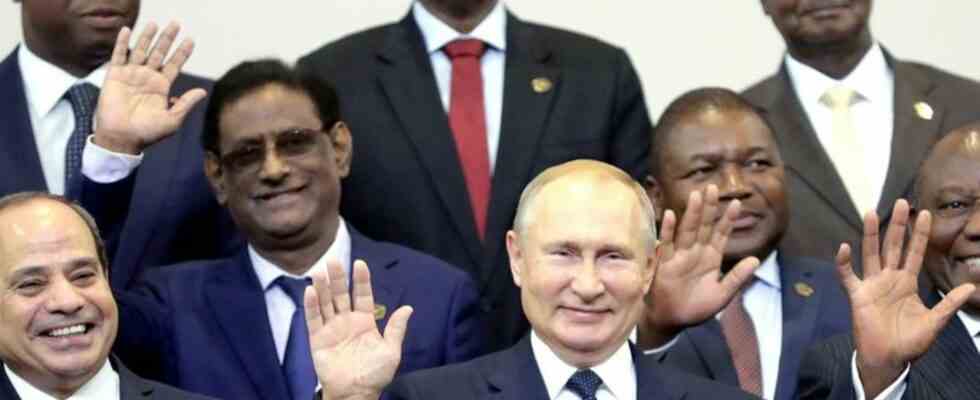power struggle
Africa: Russia, China and the USA compete for influence
Vladimir Putin (1st row, M), President of Russia, stands together with leaders of African countries for a group photo as part of the first Africa-Russia Summit. photo
© Valery Sharifulin/POOL TASS Host Photo Agency/dpa
Rarely have there been so many high-ranking visits in Africa. For months, representatives of the USA, China and Russia have been shaking hands. It’s about natural resources, security and – power.
Russia, China, the USA – all want to expand their influence in Africa. The more relations between the great powers deteriorate, the more they vie for the continent, which is rich in mineral resources and growth potential. “Africa has become an arena for competition between world powers,” says Jakkie Cilliers, political analyst at the Institute for Security Studies (ISS) in South Africa. “It’s a huge diplomatic game.”
Actually, every great power is concerned with something different. As Africa’s largest investor and trading partner, China is primarily interested in importing raw materials. The US wants to prevent Africa from becoming too closely allied with China. And Moscow?
Russia sees Africa as an instrument in the fight against the West, especially since the start of the aggressive war against Ukraine. To this end, Moscow is trying to put itself at the forefront of the anti-colonial movement. Russia is “solidary with the demands of the Africans to complete the process of decolonization and supports relevant initiatives within the framework of the UN,” said Foreign Minister Sergey Lavrov last summer. That’s something people like to hear in Africa — even if it’s obviously at odds with Russian policy to want to incorporate neighboring Ukraine.
Many visits before Russia-Africa summit
The Russian chief diplomat is currently back on the continent. Lavrov has just completed a two-day visit to West African Mali, from where France and Germany are increasingly withdrawing. Lavrov then wanted to travel on to Sudan. Visits to Tunisia, Mauritania, Algeria and Morocco are also reportedly on the agenda. By January Lavrov was already in southern Africa; before that in Egypt, the Republic of Congo, Uganda and Ethiopia. A Russia-Africa summit in St. Petersburg is planned for July. It is an unparalleled charm offensive that is also intended to show that the Kremlin is not isolated internationally.
Moscow is more welcome there than the West would wish. Many governments are positive or neutral towards the Kremlin. This was impressively demonstrated last March when the UN General Assembly voted to condemn Russia’s war of aggression: around 25 of Africa’s 55 countries abstained.
According to the Peace Research Institute Frankfurt (PRIF), Russia’s support for Africa mainly covers three areas: armaments, intelligence services and propaganda. Russia is now the most important arms supplier in Africa. Since 2015, Russia has signed around 19 military agreements with African governments. In addition, Russia is important as a supplier of food. In return, according to PRIF, Russia often receives mining concessions or geostrategic advantages such as access to ports in Libya or Sudan. The Russian mercenary group Wagner also operates in several African countries such as Mali, Libya, the Central African Republic and Mozambique.
The USA also want to expand cooperation significantly
According to experts, Lavrov’s trips to Africa are also a reaction to the Africa summit convened by US President Joe Biden in December. Washington announced that it wanted to massively expand economic cooperation with African countries. Biden announced major investments in roads, internet and renewable energy. In January, US Treasury Secretary Janet Yellen traveled to Senegal, Zambia and South Africa. Almost at the same time, China’s new Foreign Minister Qin Gang chose Africa as the destination of his first trip abroad. Chancellor Olaf Scholz, Foreign Minister Annalena Baerbock and Federal Minister for Economic Affairs Robert Habeck have also visited the continent in recent months.
China’s lead in Africa will be hard to catch up. The People’s Republic has become a major lender in Africa, particularly for infrastructure projects, says Bocus van Staden, a policy analyst with the South African Institute for International Affairs. According to the African Development Bank, China is economically active in 35 African countries.
The Chinese are popular partners and financiers for many African countries: they are quicker to make decisions and implement projects than Western countries, interfere less in internal affairs and have fewer scruples about corruption. This was the result of a survey conducted by the Friedrich Naumann Foundation among more than 1,600 African decision-makers. In some places, however, criticism of China is now also stirring because fear of dependence on Beijing is growing and the debt burden is limiting local governments’ room for manoeuvre.
The great powers are aware that Africa will play a central role in the future. Africa has 54 votes in the UN Security Council and is a large and growing market with more than 1.2 billion people and a rapidly growing population. In addition, there are the valuable raw materials that Africa has in large quantities, whether oil, cobalt, manganese, zinc or nickel. Many of them are indispensable for the production of electronic devices, for example.

